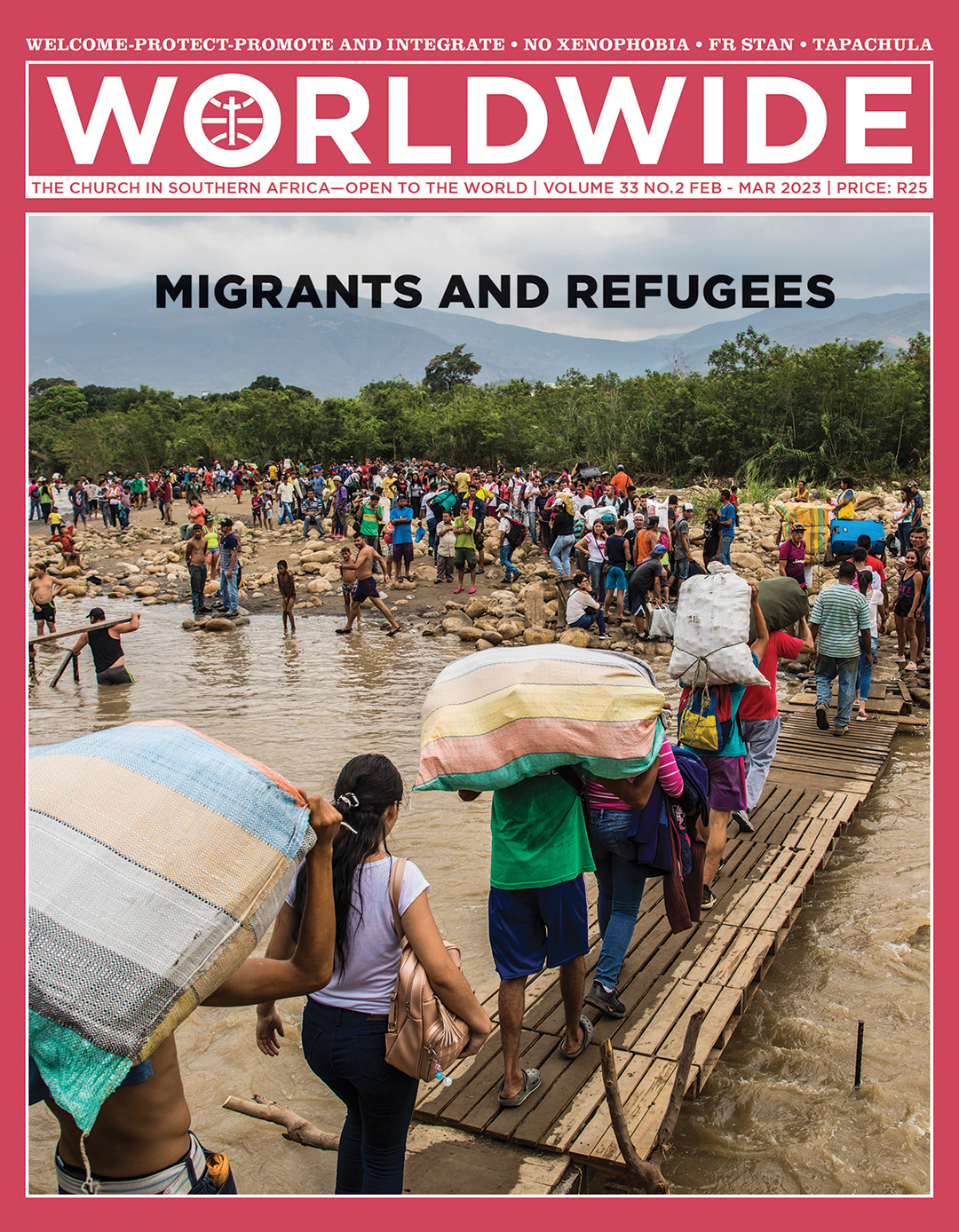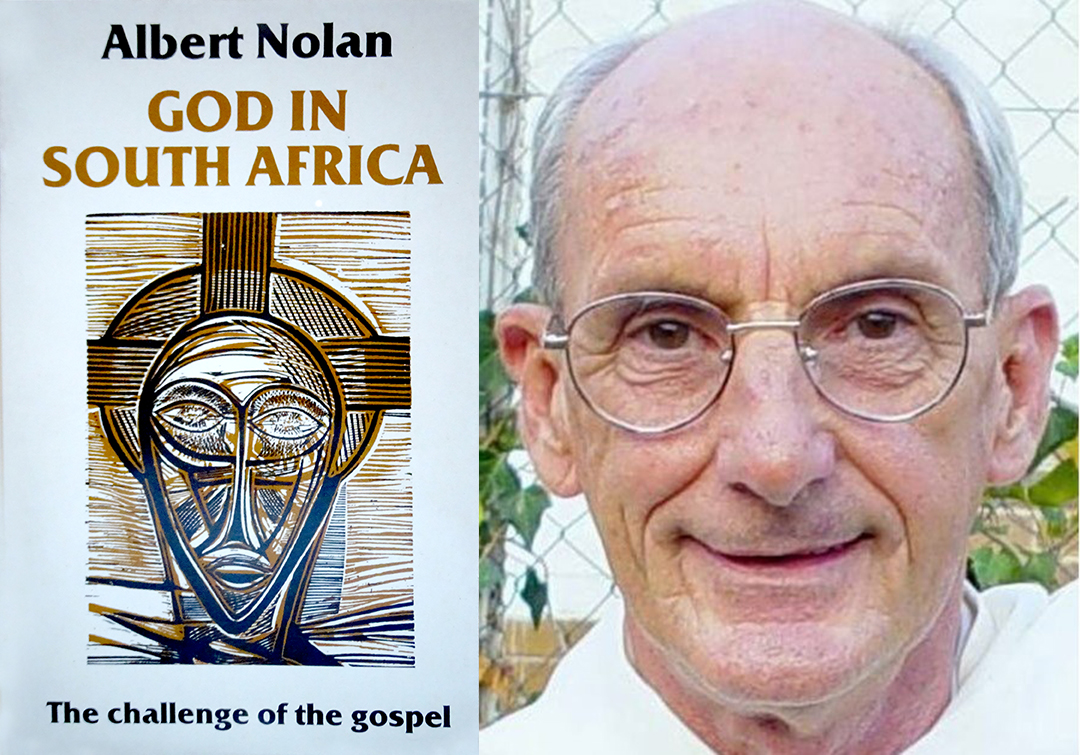Memorial • POPE BENEDICT XVI

A HUMBLE SPIRIT AND A FIRM THEOLOGIAN
The resignation of Pope Benedict XVI shocked the world in 2013. His honesty, faced with what he saw as an insurmountable task, granted him worldwide admiration. Considered as one of the greatest theologians of recent times he has also revealed himself as a mystic through his numerous writings and his search for the God of love and truth
BY DR JOSÉ MARIO BAUTISTA MAXIMIANO* | MANILA, THE PHILIPPINES
ON THE morning of 31 December 2022 at the Mater Ecclesia Monastery, the residence of the Pope emeritus in the Vatican since 2013, Benedict XVI in a soft but distinguishable voice and comprehensible words, said in Italian: Signore ti amo! (Lord, I love you!) and subsequently died.
Church bells rang out across Germany, his country of birth, and other places in mourning for Benedict XVI on the day of his funeral. Tributes from every corner of the globe poured in, while bishops everywhere
offered Requiem Masses for his soul.
His successor Pope Francis, led the funeral service on 6 January 2023 in front of 50 000 people. The German pontiff was then laid to rest in the Vatican crypt, in the same spot where St John Paul II and St John XXIII were previously buried before their canonizations, 100 feet away from the tomb of St Peter the Apostle, the first pope.
Defender of doctrine
Retired Cardinal Joseph Zen of Hong Kong believed that the late Benedict XVI will be a “powerful intercessor in heaven” for the suffering Catholics in China. He also remembered him as the Church’s intellectual force and a “great defender of the faith.”
Cardinal Joseph Ratzinger, who in 2005 assumed the Petrine Ministry as Benedict XVI, had lived in Rome since 1981, away from his motherland. As a cardinal, charged with enforcing doctrinal purity, Benedict was appointed Prefect of the Congregation for the Doctrine of
the Faith, the oldest among the sacred congregations of the Roman Curia. This congregation, now the Dicastery for the Doctrine of the Faith, was created in 1542 by Pope Paul III.
A January 2022 report on sexual abuse in the diocese of Munich, Germany, blasted Ratzinger’s ‘inaction’ regarding abuse cases during his period as archbishop from 1977 to 1982. In reaction to the report,
the pope emeritus formally apologised in writing but did not admit to any administrative failures.
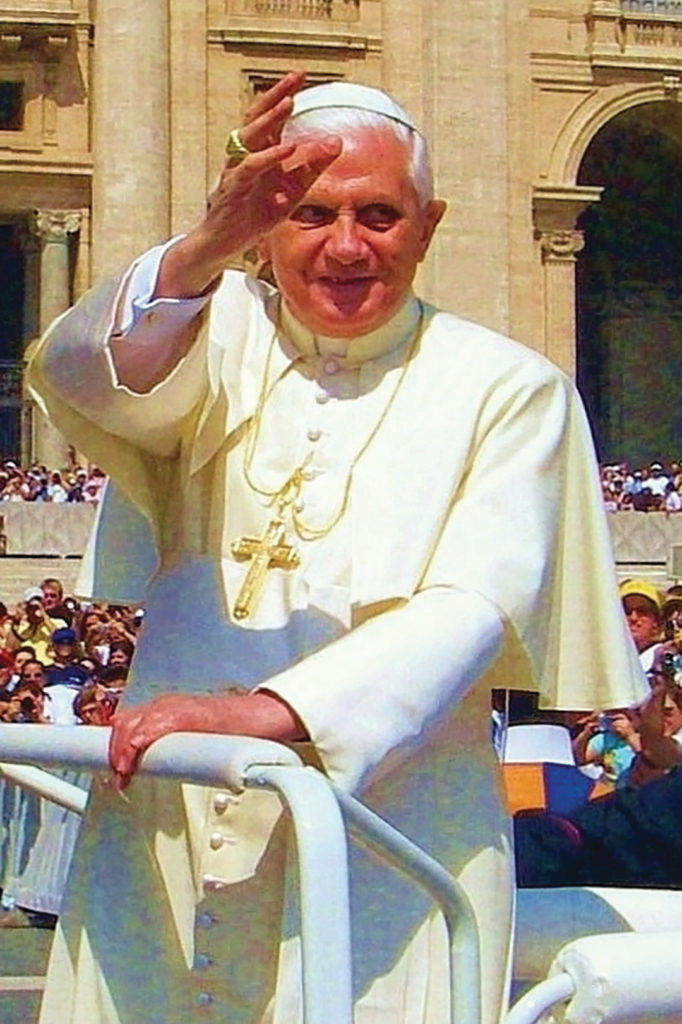
Credit: Marek Kosniowski/Wikimedia.commons.
Benedict punished Marcial Maciel, the powerful founder of the Legionaries of Christ. He publicly criticized Irish bishops for their mishandling of the sexual abuse crisis, but he did not move to open Vatican records to a public investigation.
For many survivors of clerical sexual abuse, the German pontiff’s actions were not enough. The sin imputed upon Benedict XVI appeared to be more of omission than commission and for this, the late pope was often misunderstood, seemingly a brilliant man at odds with the modern world.
However, does being misunderstood and controversial mean that he did not live a heroic life of virtues? Pius XII, although misunderstood, was declared venerable. John Paul I and John Paul II were controversial in death, but they are now considered holy pontiffs. Sanctity does not shield anyone from being misunderstood and controversial, from
betrayal, personal attacks, and gossip.
A man of humble heart
At his 2006 lecture at the Regensburg University, on religion and violence, Pope Benedict XVI quoted a hotly contested 14th-century statement made by Emperor Manuel II Palaiologos in the presence of a Persian scholar. According to the Emperor, prophet Muhammad would have brought a negative contribution to humanity. The Holy Father
remarked that the imperial address was “in an astoundingly harsh way, to us surprisingly brusque way.” The Pope quoted the Emperor’s words to make a point in his speach, but he didn’t approve of his statement.
Suddenly, the whole Islamic world exploded in anger, with high-profile politicians and religious leaders joining the bandwagon of protests against what they saw as an insulting misrepresentation of Islam.
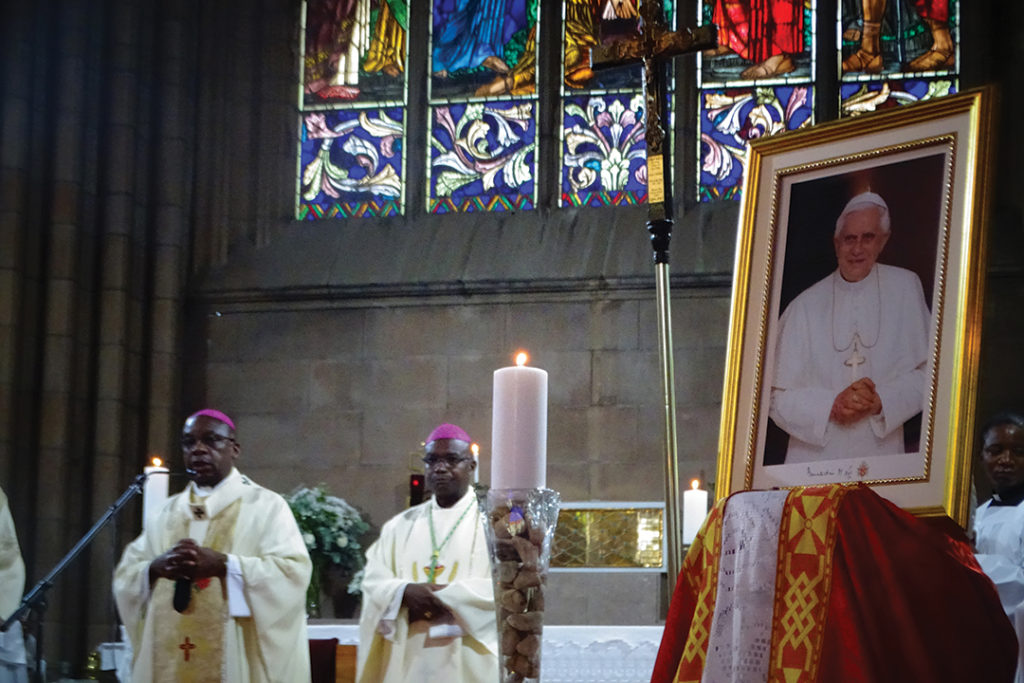
Mass street protests were mounted in several Islamic countries, with the Majlis- e-Shoora or the Pakistani parliament unanimously calling on the Holy Father to retract “this objectionable statement.”
Benedict XVI himself wrote a personal and simple note explaining his position: “I hope that the reader of my text can see immediately that this sentence does not express my personal view of the Qur’an, for which I have the respect due to the holy book of a great religion.”
The Pope emeritus, genuinely a servant leader, just knew that the Throne of Peter was meant not for supremacy but for service
The gentle Pope, in his humility and love for reconciliation, offered a sincere apology addressed to all Muslim brothers and sisters worldwide. Furthermore, against the better judgment of his advisers, the Holy Father bravely decided to visit Turkey, a predominantly Muslim country, to pray in its Blue Mosque in December 2006. Two years later, he organized the First Meeting of the Catholic-Muslim Forum with Muslim scholars and religious leaders in Rome.
Resignations
His death did not come as a surprise, unlike his resignation in 2013, announced as an electric shock for the whole world. On that occasion, Benedict XVI told the assembled cardinals:
“In today’s world, subject to so many rapid changes and shaken by questions of deep relevance for the life of faith, in order to govern the Barque of St Peter and proclaim the Gospel, both strength of mind
and body are necessary, strength which in the last few months, has deteriorated in me to the extent that I have had to recognise my incapacity to adequately fulfil the ministry entrusted to me. For this reason, and well aware of the seriousness of this act, with full freedom I declare that I renounce the ministry of the Bishop of Rome, Successor
of Saint Peter.” With his own words, ‘I renounce,’ His Holiness descended from the Chair of Peter for good!
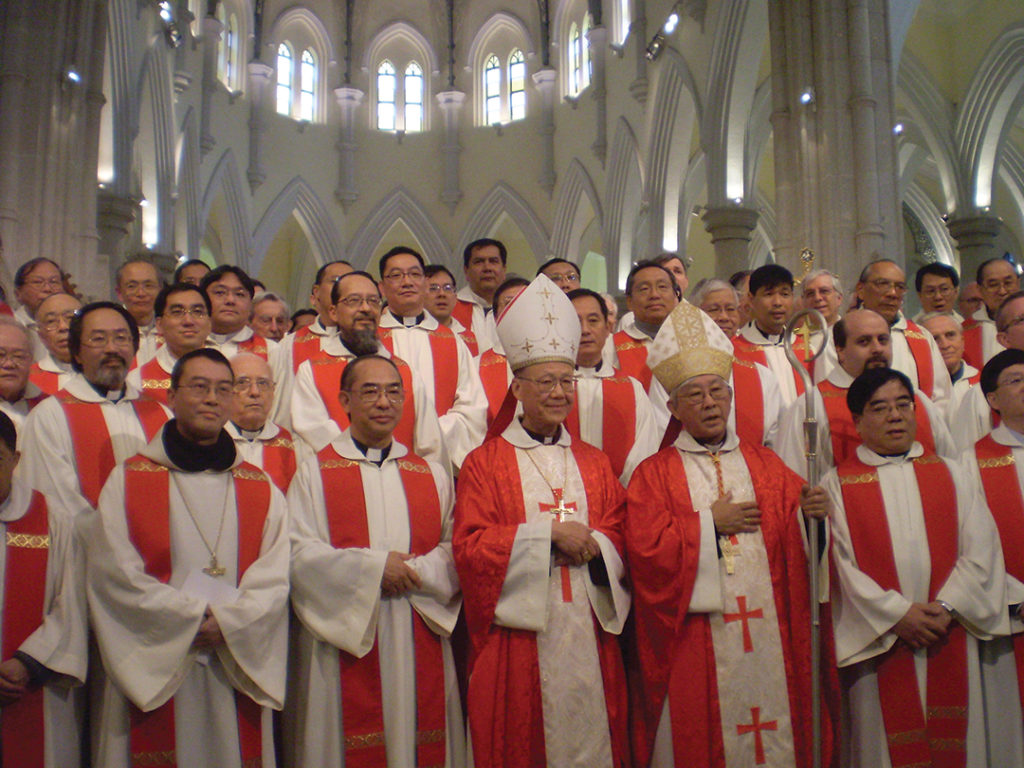
The last time a pope resigned voluntarily had been in 1294. Only after five months of being the Vicar of Christ, St Celestine V, a former Benedictine monk, resigned from his office with the intention of fleeing
Rome and going back to his hermitage in the hills of Aquila, in central Italy.
Pope Celestine had a mortal man’s desire to be alone with the Immortal God. Unlike dictators, tyrants, and other politicians, a servant leader is forever appalled by earthly power as if it were leprosy. An old manuscript from the Martyrologium Romanum explains, for our edification, Celestine’s desire to resign:
‘The desire for humility, for a purer life, for a stainless conscience, the deficiencies of his physical strength, his ignorance, the perverseness of the people, his longing for the tranquillity of his former life.’
Courageous decision
Popes are supposed to run out the clock and just wait for Father Time to come knocking and die in office. For health reasons, our German pontiff decided in 2013 to abdicate the papacy. The Pope emeritus, genuinely a servant leader, just knew that the Throne of Peter was meant not for supremacy but for service.
Pope Francis called it “an example of greatness,” that is, Benedict’s decision to abdicate the supposedly life-long papacy, a personal example of renouncing power when it’s time to renounce it.
In the morning of 28 February 2013, Pope Benedict met the College of Cardinals; by the afternoon, he had left the Vatican. He flew by helicopter to the papal summer residence of Castel Gandolfo and stayed there until he transferred to his permanent retirement home, the Mater Ecclesiae Monastery in the Vatican, on 2 May 2013.
His resignation was indeed a forceful message of detachment and simplicity to the world so thirsty for power, money, and prestige. As a retired pope, Benedict XVI ceased to wear the red papal shoes and continued to wear the white cassock but without the tufted fascia or pellegrina—a sash worn above the waist, white in colour in the case of the Pope.
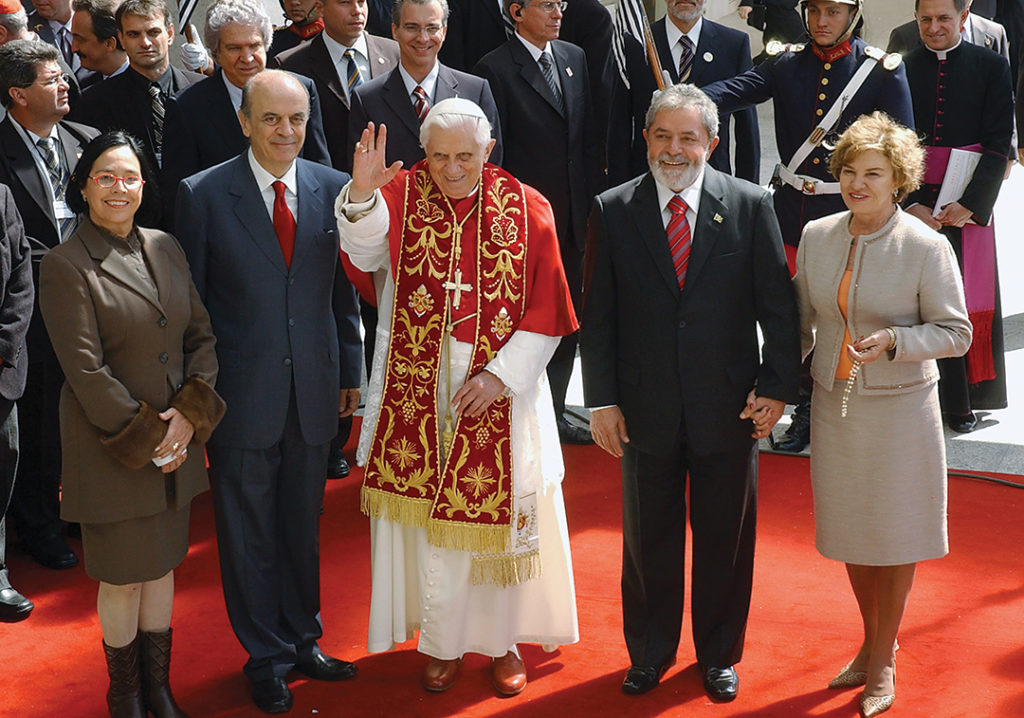
Most of all, Benedict discontinued using his official Fisherman’s Ring. So, there was never a parallel papacy since 2013. In his official farewell address to the College of Cardinals, even before the election of the next pontiff, Benedict XVI proclaimed: “In your midst is the next pope. I promise him obedience.”
By so declaring, Benedict XVI trusted that the papacy is a divine institution, rooted in apostolic succession and that the Holy Spirit is at work until the end of the world.
A total of 266 popes have governed the Catholic Church, from St Peter the Apostle to Francis, one after another, without breaking the Apostolic Succession. The nightmare scenario of a ‘parallel magisterium’ as predicted by canon lawyers and Vatican observers in 2013 never happened.
A long life
Of the 266 popes in succession, only 12 have reached the age of 85, including Pope Francis. Benedict XVI at 95 is the oldest person in history to have been pope, surpassing Pope Leo XIII, who died at 93.
He was a peaceful and introspective man deeply interested in classical music. His Holiness was an accomplished pianist who played Wolfgang Amadeus Mozart whose “music is by no means just entertainment,” according to him, for “it contains the whole tragedy of human existence.”
In 2018, Benedict XVI wrote a letter which was published in the Italian newspaper Corriere della Sera, capitalizing the word “Casa” to refer to his heavenly home. “I am on a pilgrimage toward Home,” he penned.
*Dr José Mario Bautista Maximiano is the author of MCMLXXII: 500-Taong Kristiyano (Claretian, 2021), that recently won the Best Book in Ministry at the 16th Cardinal Sin Catholic Book Awards 2022.

